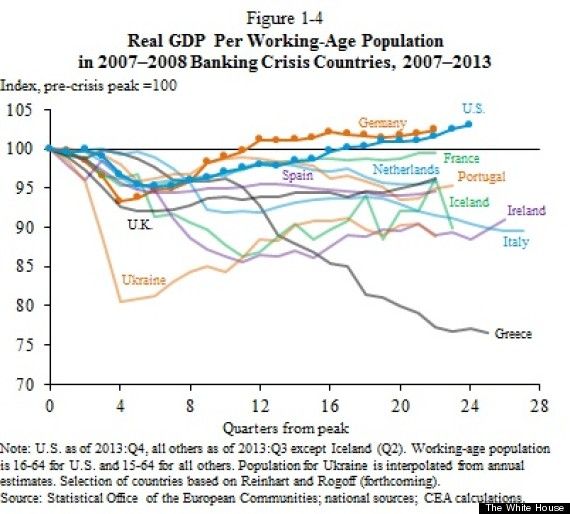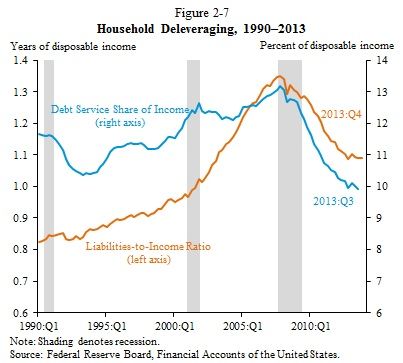Mon Mar 10, 2014 at 01:29 PM PDT
"The United States is better positioned for economic growth than any other" says Obama

President Obama just released his 2014 Economic Report of the President of the United States, along with the Annual Report of the Council of Economic Advisers. We have much to be proud of just in time for the 2014 elections. Let's let our President speak for all of us in his own words:
To the Congress of the United States:
This year’s Economic Report of the President describes how after 5 years of grit and determined effort, the United States is better-positioned for the 21st century than any other nation on Earth. We’ve now experienced 4 straight years of economic growth with more than 8 million new private-sector jobs. Our unemployment rate is the lowest it’s been in more than 5 years. Our deficits have been cut by more than half. For the first time in nearly 20 years, we produce more oil at home than we buy from the rest of the world. The housing market is rebounding, manufacturers are adding jobs for the first time since the 1990s, and we sell more of what we make to the rest of the world than ever before. But in many ways, the trends that have threatened the middle class
for decades have grown even starker. While those at the top are doing better than ever, average wages have barely budged. Inequality has deepened. Too many Americans are working harder and harder just to get by, and too many still aren’t working at all. Our job is to reverse those trends. It is time to restore opportunity for all—the idea that no matter who you are or how you started out, with hard work and responsibility, you can get ahead. That’s why this must be a year of action. I’m eager to work with the Congress to speed up economic growth, strengthen the middle class, and
build new ladders of opportunity into the middle class. But America does not stand still, and neither will I. Wherever and whenever I can take steps without legislation to expand opportunity for more American families, I will. Because opportunity is who we are. And the defining project of our generation is to restore that promise. Simply put, this opportunity agenda has four parts. Number one is more new jobs. Number two is training more Americans with the skills to fill those jobs. Number three is guaranteeing every child access to a world.
With the economy picking up speed, companies say they intend toThis chart shows that United States and Germany are the only two countries shown whose GDP has returned to the levels prior to the financial crisis of 2008. The report gives credit for this to President Obama's 2009 American Recovery and Reinvestment Act, aka "the stimulus package," the auto industry rescue, and other stimulus programs promoted by Democrats. This act seems to have created or saved about 6 million jobs. Sabrina Siddiqui reports the Presidents report in The U.S. Recovered From The Recession Faster Than Every Country But Germany, which inspired my first title, however, upon closer inspection the sample for that study was limited to just the 12 major economies thrown into recession by the financial collapse, which leaves out China. So, I changed the title to be more clear.
hire more people this year. We should make that decision even easier for
them by closing wasteful tax loopholes and lowering tax rates for businesses that create jobs here at home, and use the money we save in the process to create jobs rebuilding our roads, upgrading our ports, and unclogging our commutes. We should help America win the race for the next wave of high-tech manufacturing jobs by connecting businesses and universities in hubs for innovation. We should do more to boost exports
and fund basic research. We should maintain our commitment to an all-of-the-above energy strategy that is creating jobs and leading to a safer planet. Finally, we should heed the call of business leaders, labor leaders, faith leaders, and law enforcement, and fix our broken immigration sys tem. Independent economists say this will grow our economy and shrink our deficits by almost $1 trillion in the next two decades. We should get it done this year.
Good job President Obama and Democrats who supported these controversial stimulus measures. Remember, Mitt Romney's plan was to let Detroit go bankrupt. While I don't usually like to be partisan at times of national celebration, there are times at which we should give credit where credit it due.
1:45 PM PT:
Termite calls our attention to a big point about contrasting austerity
versus stimulus. Or, as I would put it more crudely, "Hey Greece, how's
that austerity thing working out for you?" Except, that wouldn't be
fair, since it was force on them by the EU, so I won't say that.
2:23 PM PT: Post updated to take out duplicate working paragraph, and add a comma after "Remember,".
I've been reading an article on 18 Rules for Using Commas, and think I've figured out about 12 of them. If anyone ever has punctuation suggestions please share them as I am trying to take my writing to the "next level."
2:53 PM PT: Changed title while researching title, and exact comprehensiveness of study. Sorry.
3:08 PM PT: Jim Kuhnhenn, The Associated Press.
3:14 PM PT: Here's an additional summary overview from the full 495 page report which I am still reading.

2:23 PM PT: Post updated to take out duplicate working paragraph, and add a comma after "Remember,".
I've been reading an article on 18 Rules for Using Commas, and think I've figured out about 12 of them. If anyone ever has punctuation suggestions please share them as I am trying to take my writing to the "next level."
2:53 PM PT: Changed title while researching title, and exact comprehensiveness of study. Sorry.
3:08 PM PT: Jim Kuhnhenn, The Associated Press.
The qualification "only two of 12 major economies that were hit by the 2008 international financial crisis" was what was missing from my original title. FishOutofWater asked about China so I changed it, while I'm researching, but I do not believe China's economy went into recession. My first title went beyond these qualifiers, in any even, sorry.
WASHINGTON — President Barack Obama’s top economists say the nation is on track to make economic progress over the next two years, but say it would do even better if Congress would enact the additional spending he proposed in his most recent budget. A divided Congress in an election year is not likely to heed that call.
In their annual report to the president, the Council of Economic Advisers says the nation’s economy would grow by 3.3 percent in 2014 and 3.5 percent in 2015 and that unemployment would drop to 6.4 percent in 2015 and 6 percent in 2016. February’s unemployment rate was 6.7 percent. ...
The White House report also says the United States and Germany are the only two of 12 major economies that were hit by the 2008 international financial crisis to have returned to pre-crisis economic output.
3:14 PM PT: Here's an additional summary overview from the full 495 page report which I am still reading.
Chapter 1 introduces the Report and highlights several key areas where progress has been made, but it also lays out the areas where much more work remains to be done. In particular, recoveries from financial crises are uniquely challenging because heavy household debt burdens and tight credit conditions can linger for years, depressing spending and investment. However, as shown in Figure 1-4 of the Report, among the 12 countries that experienced a systemic financial crisis in 2007 and 2008, the United States is one of just two in which output per working-age person has returned to pre-crisis levels. The fact that the United States has been one of the best performing economies in the wake of the crisis supports the view that the full set of policy responses in the United States made a major difference in averting a substantially worse outcome—although it in no way changes the fact that more work remains to be done.3:23 PM PT: Here's a summary of Chapter 2 of this 495 page report, and an impressive graph showing substantial improvement in "deleveraging" or debt ratios.

Chapter 2 reviews the economy’s performance in 2013 and discusses the key reasons why the Administration, like other forecasters, expects growth to strengthen in the coming years. Five years removed from the worst of the financial crisis, the economy continues to strengthen and recover, with businesses adding 2.4 million jobs in 2013, the third straight year private employment has risen by more than 2 million. Looking to 2014, one key reason that growth is expected to pick up is that households have made substantial progress in paying off debt, a process known as deleveraging, putting them in a better position to increase spending going forward. As shown in Figure 2-7, household debt has fallen from a peak of about 1.4 times annual disposable income in the fourth quarter of 2007 to 1.1 times annual disposable income by the fourth quarter of 2013.
Similarly, debt service (that is, required minimum payments on household debt) has fallen from a high of 13 percent of disposable income in the fourth quarter of 2007 to 10 percent by the third quarter of 2013, its lowest since the data begin in 1980. It is important to note, however, that while these figures paint a picture of improvement in the aggregate, many moderate- and middle-income households have seen little benefit from recent stock market gains and are still grappling with the implications of home prices that, despite recent progress, remain well below their previous highs. Other reasons to expect stronger growth in 2014 than in 2013 include diminished fiscal drag, a recovery in asset values, strengthening among our international trading partners, and demographic forces that are expected to maintain upward pressure on housing starts—although all of these factors need to be balanced against the uncertain risks that can always adversely affect the economy.
No comments:
Post a Comment
Please leave a comment-- or suggestions, particularly of topics and places you'd like to see covered